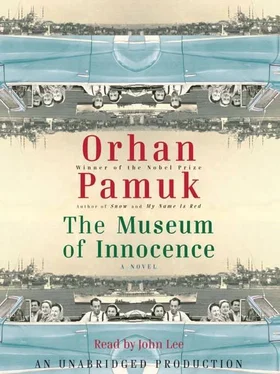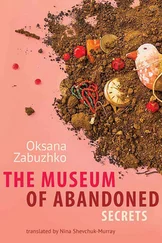The intellectuals, filmmakers, and pouting starlets frequenting places like the Pelür would be drunk by eight in the evening: Seeing how scandalized I was by the ensuing vulgarities, my world-weary friend Salih Sarılı gazed across the room with a romantic expression that recalled the noble, idealist policeman roles that he had personified for so many years, and, fixing his eyes on Füsun, who was sitting at a distant table, laughing with someone I didn’t know, he allowed that were he a rich businessman, he wouldn’t be bringing a beautiful relation to bars like this for the purpose of her becoming a star. This broke my heart. I was now obliged to add my actor-dubber friend to my list of “men who looked at Füsun in the wrong way.” Conniving Sühendan made a more oblique comment one day that I would never forget: My beautiful relative Füsun, she said, was a sweet and good and lovely girl, just the right age to become a very good mother, like the one who had given birth to the grandson for whom she was knitting the red, yellow, and navy blue pullover. But what were we doing here?
I, too, would eventually succumb to such anxieties. For every week Füsun was making new acquaintances in the film bars of Beyoğlu, admirers who were continually proposing to use her in this photoroman or that commercial. And so at the beginning of 1977 I signaled to Feridun that the time had come to decide on his technical team. From her friendly smiles and the way she touched me when she whispered funny stories into my ear, Füsun had led me to believe she would leave Feridun soon. As I was planning to marry her the “very next” moment, I told myself that it would be better for her, too, not to become too involved in this sordid world. We could make her an actress without cozying up to such people. It was at about this time that the three of us decided that our joint venture was better managed from an office than in the Pelür Bar. The moment had come to set up a company to finance Feridun’s films.
It was at Füsun’s jolly suggestion that we agreed to name the company after Lemon the canary. As one can gather from our business card, bearing the likeness of the charming bird, Lemon Films was located next door to the New Angel Cinema.
I arranged for 1,200 Turkish lira to be deposited every month in a personal account at the Beyoğlu branch of the Agricultural Bank. This sum was slightly more than the salaries I paid my two top managers at Satsat: Half would pay Feridun’s salary as the firm’s managing director, while the rest would cover the rent and the production costs.
57 On Being Unable to Stand Up and Leave
ONCE I had begun to pay Feridun through Lemon Films, growing more convinced with each passing day that there was no need to rush into production, I felt much better, even about going to Füsun’s for supper. Or more truthfully, some nights, when my desire to see Füsun was too strong to resist, and my heart would be seized by a shame no less powerful, I would tell myself that somehow because I was now giving them money there was no longer cause for shame. The need to see Füsun had so fogged my mind that I never examined the logic by which the payments expunged the disgrace. But I remember sitting with my mother in front of the television in Nişantaşı around suppertime one evening in the spring of 1977, yet again caught between desire and shame, doubled up in my father’s chair (now mine), paralyzed by indecision, for half an hour, unable to move.
My mother said what she always said now on seeing me at home in the evening. “Why don’t you stay in for a change, and we can eat something together.”
“No, Mother dear, I’m going out.”
“Goodness, I had no idea there were so many diversions in this city. You can’t stay away from it for a single night.”
“My friends insisted, Mother dear.”
“I wish I were your friend instead of your mother, left alone in life… Look, Bekri could run down to Kazım’s and buy some lamb chops; he could grill them for you. Sit down and have supper with me. You can eat your lamb chops and then go see your friends.”
“I could go down to the butcher right now,” Bekri called out from the kitchen.
“No, Mother, this is an important party,” I said. “The Karahans’ son is hosting it.”
“Then why haven’t I heard about it?” my mother said, rightfully suspicious. What did my mother or Osman or anyone else know about the frequency of my visits to Füsun’s? I didn’t want to think about this. On the nights I went to Füsun’s house, I would sometimes have supper with my mother first, just to allay her suspicions, and then go and eat again at Füsun’s. On nights like this, Aunt Nesibe would notice at once my lack of interest in the food, and she’d say, “You have no appetite this evening, Kemal; didn’t you like the vegetable stew?”
There were times when I would eat supper with my mother, thinking that if I could survive those hours when I missed Füsun most intensely, I would have the strength to stay at home, but one hour and two glasses of raki later, my longing would grow to such proportions that even my mother could not fail to notice.
“Look at you with your legs twitching again. Why don’t you walk off your nervousness and come back,” she’d say. “But please, don’t go far, I beg you, not with the streets as dangerous as they are these days.”
I have no desire to interrupt my story with descriptions of the street clashes between fervent nationalists and fervent communists at that time, except to say what we were witnessing was an extension of the Cold War. In those years people were being murdered in the streets continually; coffeehouses would be machine-gunned in the middle of the night, and every other day there were university takeovers or boycotts, bombs going off, and banks being raided by militants. Slogans had been written over slogans on every wall in the city, and in every color. Like most people in Istanbul, I had no interest in politics, and it seemed to help no one that this war was being waged in the streets by an assortment of ruthless factions, none of which had anything in common with the rest of us. When I told Çetin, who’d been waiting for me outside, to drive carefully, I was speaking as if politics were as natural a cataclysm as an earthquake or a flood, and there was nothing we ordinary citizens could do except try our best to stay out of its way.
If I was unable to stay at home, as on most evenings, I didn’t always go to the Keskins’. Sometimes I’d go to a party, hopeful of meeting a nice girl who would help me forget Füsun; sometimes I would go out for a few drinks with old friends and chat. If Zaim had taken me to a party, or, finding myself in the home of some distant relation recently come into society, I ran into Nurcihan and Mehmet, or if, late at night, Tayfun had driven me to a nightclub and, bumping into long-lost friends, we ordered a bottle of whiskey and sat together listening to Turkish pop songs (mostly rip-offs of French and Italian pop songs), I would alight upon the mistaken notion that I was slowly returning to my former healthy life.
It was not the shame and indecision I felt in advance of going to Füsun’s that bespoke the gravity of my affliction, but rather the indecisive inertia that overtook me when, having sat with them for hours, eating supper and watching television, the time to go home had come. Besides the shame of ordinary inertia, there was in the extreme instance the shame I felt when I was literally unable to summon the will to leave the Çukurcuma house at all.
The television broadcast would end every evening between half past eleven and midnight, and the images of the flag, Atatürk’s mausoleum, and “our boys” in the army would be replaced by a snowfall of blurry dots, which we would also watch for a while, as if some further program might come on by mistake, until Tarık Bey said, “Füsun, my girl, let’s turn this thing off now,” or else Füsun did so unbidden, with a single touch. And so would begin the particular misery I now wish to analyze. The feeling that if I did not stand up at once and leave there would ensue great discomfort in everyone. I couldn’t reckon how apt it was to worry about this. I would just think, I’ll be getting up soon. Having heard them speak ill of guests who dashed off the moment the broadcast ended, with scarcely a “good-night,” and of neighbors without televisions of their own who did likewise, I deluded myself, imagining I was merely being polite.
Читать дальше












